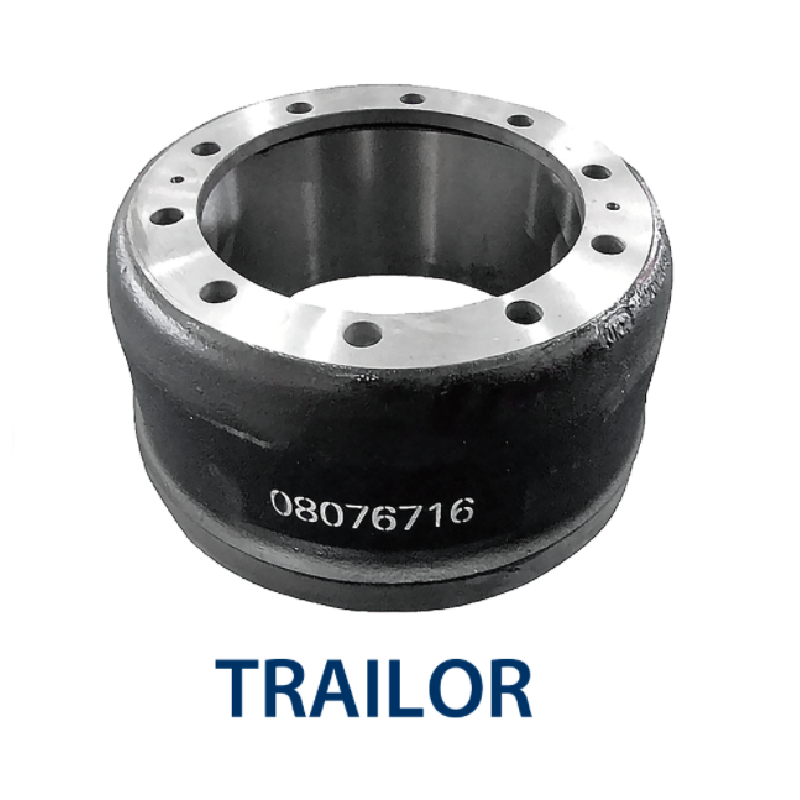ਅਕਤੂਃ . 18, 2024 09:24 Back to list
New Brake Shoes Prevent Drum from Fitting Properly in Vehicle Repair Process
Troubleshooting Brake Drum Issues with New Shoes
When it comes to vehicle maintenance, the brake system is one of the most critical components to keep in optimal condition. However, DIY repairs can sometimes lead to complications, especially when replacing brake shoes and drums. A common issue that many car enthusiasts and everyday drivers encounter is when the brake drum won't fit over new shoes. This can be frustrating, but understanding the potential causes and solutions can make the process smoother.
Understanding Brake Systems
Before diving into the issue, it's essential to understand the basic mechanics of drum brakes. A drum brake system consists of several parts, including the brake drum, brake shoes, wheel cylinders, and springs. When you press the brake pedal, hydraulic pressure forces the brake shoes against the inner surface of the drum, creating friction that slows down the wheel. Over time, these components wear down, necessitating replacements.
Common Reasons for Brake Drum Misfit
1. Thickness of New Brake Shoes One of the most common reasons a brake drum won't fit over new shoes is the thickness of those shoes. If you've selected aftermarket brake shoes or if they are a different brand than the originals, they might be thicker. Always compare the new shoes with the old ones to ensure they match in dimensions.
2. Improper Installation Another reason could be improper installation of the brake shoes. If the shoes are not correctly positioned or if the adjusting mechanism is not set properly, the shoes will protrude beyond the correct distance, making it impossible for the drum to fit. Double-check the installation against manufacturer specifications.
3. Rust and Debris Over time, rust, dirt, and debris can accumulate on the brake drum, affecting the fit. Before installing the drum, clean the interior surface thoroughly. Use a wire brush or sandpaper to remove any rust. Additionally, inspect the brake shoes for debris that could hinder their proper placement.
4. Drum Wear or Damage Brake drums can wear out or become damaged over time. If the drum is worn unevenly or is warped, it may not fit properly over the new brake shoes. Inspect the drum for signs of wear, such as excessive grooves, scoring, or warping. If the drum is damaged, it might need resurfacing or replacement.
5. Adjustment Issues Brake shoes must be adjusted correctly to ensure that they fit within the drum. Many drum brake systems have an automatic adjuster that can sometimes malfunction. If the adjuster is stuck or broken, it may need to be repaired or replaced to allow for proper fitting.
brake drum won't fit over new shoes

Solutions to the Problem
If you find yourself facing the dilemma of a brake drum that won’t fit over new shoes, consider the following steps
- Compare Sizes First, ensure that the new brake shoes are indeed the correct size. Check the part numbers and measurements against the vehicle specifications.
- Reinstall Properly If the shoes are correctly sized, remove them and reinstall them according to the manufacturer's instructions. Make sure to follow any specific adjustments.
- Clean Components Clean the brake drum's inner surface and the shoes themselves. Ensuring that both surfaces are free of rust and debris can significantly impact their fit.
- Check the Drum If cleaning doesn't work, inspect the drum for damage. If it’s excessively worn, replacing it may be the best option.
- Adjust the Shoes If you suspect adjustment issues, manually adjust the shoes to ensure they don't protrude beyond the drum’s edge.
Conclusion
Replacing brake shoes and drums can be a straightforward task for those with mechanical skills. However, issues like a brake drum that won’t fit can pose challenges. Whether it’s due to mismatched sizes, improper installation, or damaged components, understanding these common reasons can help in troubleshooting the problem effectively. Always remember to prioritize safety by keeping your brake system in top condition, as it is vital for ensuring your vehicle’s overall performance and safety on the road. If in doubt, consulting a professional mechanic is always a wise decision.
-
HINO Industrial Solutions - ¡Ң���ຽ��е��������˾ | Advanced Efficiency&Customization
NewsJul.13,2025
-
HINO Industrial Efficiency Solutions - ¡Ң���ຽ��е��������˾
NewsJul.13,2025
-
HINO Industrial Solutions - ¡Ң���ຽ��е��������˾ | Advanced Technology&Reliability
NewsJul.13,2025
-
HINO Industrial Efficiency-Jiangsu Hino Industrial|Productivity Optimization&Cost Reduction
NewsJul.12,2025
-
HINO-¡Ң���ຽ��е��������˾|Advanced Industrial Solutions&Energy Efficiency
NewsJul.12,2025
-
Premium Brake Drum Iveco – Durable Drum Brake Drum & Brake Shoe Solutions
NewsJul.08,2025
